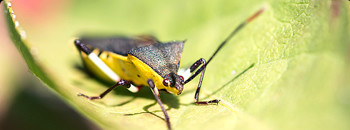With so much information circulating on the Internet, it’s hard to discern between facts and opinions and credible and non-credible sources, especially when it comes to pesticide products and their use. And sometimes, seemingly credible sources and studies aren’t always that. On top of that, it seems fashionable to label lawn care operators – once touted as stewards of the environment –as polluters of the earth.
Lawn care operators support the continued development and use of new products and solutions – organic or synthetic. But a lot of current conversation points to organic product methods as the best for the environment, applicators, and public health, and it’s important to realize organics aren’t always what they seem.
Myth #1: Organic or natural equals safe or good for the environment.
Organic pesticides are not always safer or better for the environment. They can be used safely, with the right training and education—but used in high concentrations needed to be effective for pest or weed control, they can be toxic. For example- Acetic acid (better known as vinegar) in a high enough concentration can draw the moisture out weeds, killing the plants. It’s non-selective, which means it could kill any plants that it comes in contact with – even your desirable flowers. More importantly, in such high concentrations, acetic acid can cause burns or could even be fatal if swallowed.
Myth #2: Applicators who use organic products care more for the environment.
There’s a public disconnect in understanding what applicators do regardless of whether they follow organic or conventional application methods. There’s not so much of a difference in what we do as to what tools we choose to use. Lawn care professionals, whether we use a combination of pesticide products or choose only organic options, all have the same goal in mind – to positively impact how we grow and maintain healthy lawns in environmentally-friendly ways. Most of us practice an integrated pest management (IPM) approach, which means we use the best treatment or prevention solution available – organic, conventional, or a solution that doesn’t require any products at all.
Myth #3: Pesticides are used extensively in an Integrated Pest Management (IPM) approach.
With a plan for identifying, monitoring and as much as possible, preventing problems, IPM is our first line of defense in protecting against plant disease, insects, rodents, and noxious weeds. Controlling these hazards –grubs, ticks, mosquitos, poison ivy, etc. – and preventing them from reaching hazardous levels is important to the health of families, pets, and communities. Pesticides are just one tool within the IPM toolbox. At times we have to combine multiple methods – mechanical, biological, etc. to control a particular problem, but we are trained to evaluate the problem and determine the best treatment option prior to application.
Myth #4: Pesticide applicators only care about their bottom line.
Nothing could be further from the truth.
It’s our job as lawn care operators to be solution providers for our customers. Keeping them satisfied, safe, and healthy keeps us in business. It’s in our best interest (and better for our bottom line) to use products efficiently and effectively. We are trained to evaluate problems and use spot applications that target specific problems and reduce exposure to off-target organizations. Today, EPA-approved pesticides are more technologically advanced and are safer than past product iterations, when applied according to label.
At the end of the day, safety is our top priority. Regardless of what type of product you choose to use—synthetic or natural—applying according to the label is key.
As a homeowner, try your best understand the pest or weed problems you face and the information that’s available. Ask questions and consult your local lawn care operator or extension agency on ways to safely and effectively treat the issues.
This is a guest post written by Eric Wegner, president and co-owner of Complete Lawn Care, Inc.
As President and Co-owner of Complete Lawn Care, Inc., Eric Wenger has worked in the lawn care and landscaping industry for more than three decades and is an Integrated Pest Management (IPM) Specialist, a Montgomery County Master Gardener, and a member of The Professional Grounds Management Society (PGMS).

